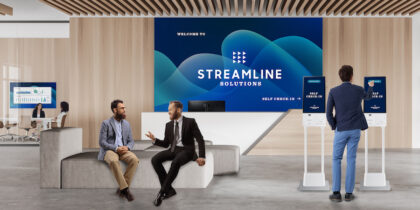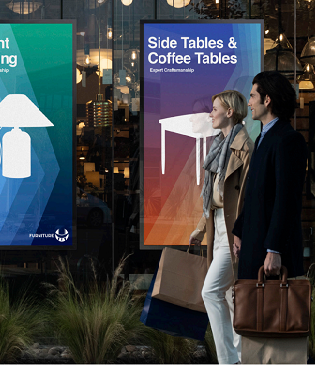Over the past few years, self-service retail solutions have become ubiquitous. Consumers now expect self-service options everywhere they shop — from checking out at the grocery store to placing an order at a restaurant.
According to Soocial, 66% of consumers prefer self-service options over interacting with store employees, and 47% think self-payment kiosks improve the shopping experience. More than a third expect to increase their use of self-checkout kiosks in the future. Retailers must meet customer demand for self-service options or risk losing customers to competing brands that do.
The Samsung Windows All-In-One Kiosk helps brands institute a self-service checkout option quickly, easily and affordably. The sleek, all-in-one solution comes with a Windows operating system already installed. Featuring an interactive touch screen display, printer, scanner, payment processor and more, Samsung Kiosk with Windows OS is suitable for businesses of any size. Here’s how this innovative solution can help your retail business boost revenue, increase operating margins, and enhance the customer journey.
1. Improve the customer experience
Consumers want convenience and consistency in a self-service solution. Contactless technology like the Samsung self-service kiosk ensures a simple shopping experience where customers can browse, order and pay in one location. There’s no need to wait for a sales attendant to answer questions or help with checkout. Your kiosk gives customers the help they need whenever they need it.
Kiosks can also help customers ensure accuracy when placing special orders. Rather than trying to communicate their needs to a sales representative, customers can use the self-checkout kiosk to place the order themselves, minimizing the potential for frustration caused by miscommunication during the transaction.
2. Increase upsell opportunities
One of the biggest advantages of retail self-service kiosks is the ability to upsell. New or busy employees may forget to mention upsell offerings, causing your business to lose out on easy profits. Kiosks, however, let customers see every available option, which they can explore without rush or judgment.
In a cosmetics store, for instance, operators can promote limited-time offers on the kiosk’s home screen, or suggest add-ons and product samples. Self-checkout kiosks can also be programmed to allow other kinds of purchases, such as gift cards and memberships, and to encourage enrollment in your loyalty program.
3. Flexible design and sleek aesthetic
For a lot of brands, store design is a signature part of the brand aesthetic. Samsung Kiosk’s variety of mounting options gives retailers the flexibility to install it wherever is most ideal for their specific needs. The self-service display can be installed on any countertop or table without any additional construction.
If you opt for the floor stand, it can be positioned and moved anywhere in your store. Your kiosk can also be wall-mounted to maximize space savings, and its neutral grey-white tone fits in with any existing aesthetic. Plus, the built-in printer and Wi-Fi system eliminate the need for added, clunky hardware.
How digitizing retail experiences boosts ROI
Explore customer behavior with and the operational benefits of a complete digital retail ecosystem. Download Now
4. Easy installation
Traditional kiosk solutions are often associated with prohibitive lead time caused by complex, costly installations. Samsung Kiosk cuts that all out by arriving ready to use straight out of the box, including the payment and printing features, so retailers can deploy the kiosk in minutes — no custom configuration or assembly required. For increased payment flexibility, Samsung Kiosk works seamlessly with a variety of PIN pads approved by financial institutions.
With such ease of use and a more accessible price point, kiosk opens the door for smaller retailers to join the self-service revolution. Increased adoption of this technology ultimately promotes safety and convenience for everyone.
5. Remote device management with VXT
In the fast-paced retail industry, it’s critical that operators are able to control their self-service kiosks and turn them on or off at a moment’s notice. The Samsung proprietary remote management system, VXT, empowers retailers to manage their devices and diagnose issues from any web-enabled device, anywhere in the world. There’s no need for external device management software or hardware.
With VXT, managers can access display information, check the status of peripheral devices and resolve errors quickly. Industry-leading security, 24/7 support, and the ability to gain powerful insights make this tool an invaluable asset for businesses.
6. Durable and shatter-resistant
In high-traffic retail areas, anything can happen: slips, falls, runaway carts, rambunctious kids — the list goes on. To further protect customers — and your investment — Samsung Kiosk comes with a shatter-resistant film that prevents its 24-inch screen from breaking into shards. The UL-certified antimicrobial coating also prevents the screen from being tarnished by oxygen and sulfur in the air, maintaining crystal-clear picture quality throughout the device’s lifespan.
Self-service kiosks are a smart way for retailers to stay in tune with their customers’ needs. With its simple setup, durable hardware, and robust content management capabilities, Samsung Kiosk is an affordable solution that retailers can install quickly and easily to help increase profits, enhance the customer journey, and meet customer demand for contactless checkout and payment options.
Learn more about how the Samsung Kiosk can enhance and streamline the customer journey, and discover how fan data can drive the next generation of live events and audience engagement with this free guide.







